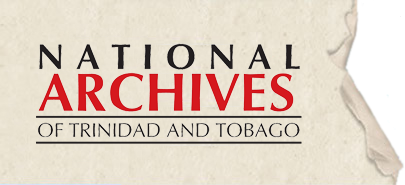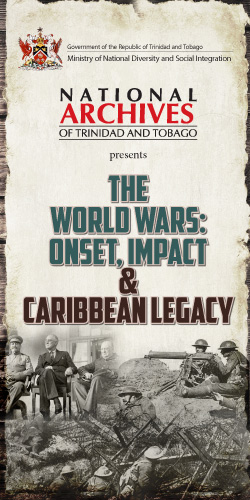As part of its outreach programme, the National Archives curates exhibitions that bring to life various aspects of our history through the use of our diverse collections. While most exhibitions are mounted in our Search Room, we also accommodate off-site exhibitions upon request.
Below is a list of exhibitions which we have mounted over the years. The files are downloadable for your use. We however request that you acknowledge the source as the National Archives if you are using in the public domain. We would like to hear of your activities and how you are using our material by sending us an email at enquiries@archives.gov.tt
|
|
|
|
Celebrating Our Ancestral Roots Journey to our past to discover the origins of our ethnic diversity. "Celebrating Our Ancestral Roots – Your Story, Our History" was the theme for the National Archives' 6th Annual Archives Awareness Week in 2017.
|
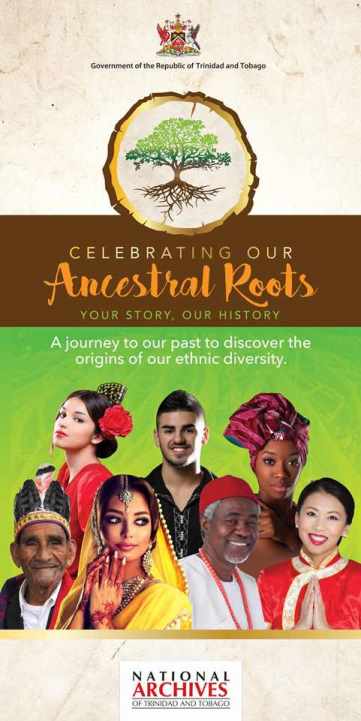 |
| The Road to Nationhood: Crown Colony Government to Republicanism
Trinidad and Tobago became an independent nation in 1962 and republic in 1976. It was a journey which started in 1898 when Tobago was united with Trinidad as a British Crown Colony. Through documents and photographs from our collection, we invite you to join us in a journey that charts the milestones on our road to nationhood. |
 |
| The 1970 Black Power Revolution
The 1970 Black Power Revolution or Black Power Movement, led by the National Joint Action Committee, marked a significant milestone in the history of Trinidad and Tobago as it initiated socio-political change. The unfolding of its events are revealed in newspapers reports of that time. |
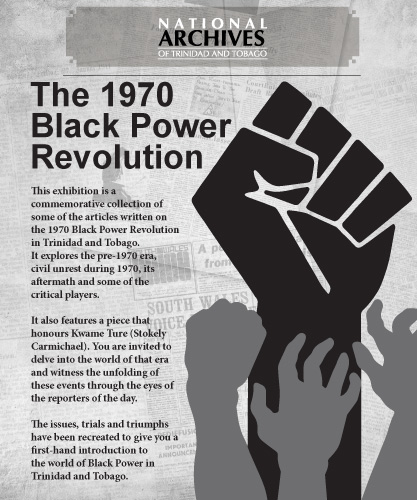 |
|
The World Wars: Onset, Impact and Caribbean Legacy This exhibition supports the Caribbean Advanced Proficiency Examination (CAPE) History Curriculum by highlighting the causes and consequences of the World Wars and its impact and legacy in the Caribbean, with specific reference to Trinidad and Tobago. Click here to download (14.18 MB)
|
|
| Tubal Uriah "Buzz" Butler and the man and his times
Labour Day in Trinidad and Tobago is observed on June 19, a day which has particular significance to the trade union movement. It was the Labour Riots of 1937, led by Uriah Butler, which was the catalyst for change in working conditions among workers as well as labour legislation improvements and the growth of trade unionism. |
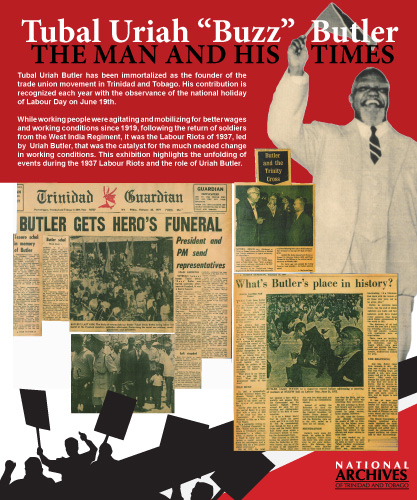 |
| The Rise and Fall of King Sugar
This exhibition is a permanent exhibition at the National Archives' Sugar Archives and Documentation Centre, launched in 2015 at Brechin Castle, Couva. It traces the origins of the sugar industry in both islands of Trinidad and Tobago and the development of Caroni Ltd, which was acquired by the Government of Trinidad and Tobago from the British in 1975. In 2003, Caroni (1975) Ltd was closed, ending a "bitter-sweet" past which was the catalyst for our early economic development and rich ethnic and cultural diversity. |
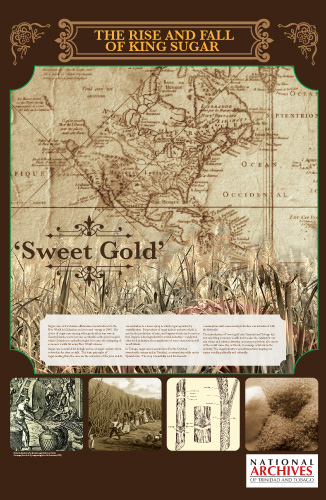 |
| Our African Heritage: Stories of resistance and resilience in familiar places.
Inspired by Eintou Pearl Springer's publication "African Heritage Sites," we discover little-known but compelling stories of African resistance and resilience in familiar places in both islands of Trinidad and Tobago. |
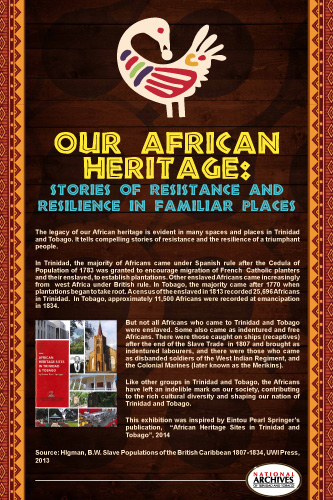 |
|
Discovering History at Our Doorstep The history of the space occupied by the National Archives of Trinidad and Tobago on St. Vincent Street, and its environs, is rich and diverse. Juxtaposed between New and Oxford Streets, in upper Port of Spain, the space reveals art, commercial and family histories as well as features architectural gems such as gingerbread houses and a barrack yard dwelling. |
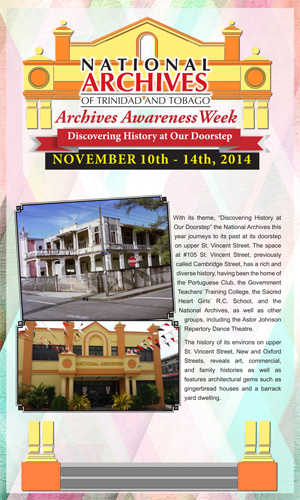 |
|
Nelson Island and Indian Indentureship in Trinidad Nelson Island is one of five islands off the west coast of Trinidad which was used as a landing, immigration and quarantine station for the Indian indentured immigrants from 1866 to 1917. Discover the role that Nelson Island played in the arrival and settlement of the indentured Indians, who came as labour for the sugar plantations after the emancipation of the enslaved in 1838. |
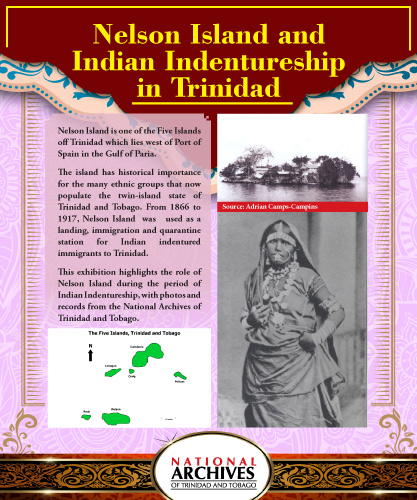 |
| Celebrating the Merikins: our heritage, our faith, our future
In the early 1800s, even before slavery was abolished, a group of free African-Americans and ex-soldiers came to settle in Trinidad. Called the Merikins, an abbreviated version of the word "Americans," they occupied six villages in south Trinidad and developed a unique community identity and heritage which is still kept alive today. This exhibition commemorated the 200th anniversary of their arrival in Trinidad, a collaboration with the Merikin Heritage Foundation. |
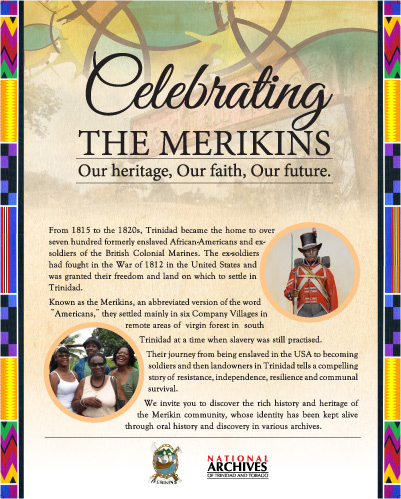 |
| Honouring our Industrial Roots: Sugar, Cocoa, Asphalt and Oil
Join us on a journey as we revisit the industries that have built our nation. Learn of the origins, milestones, production, management and labour used in the sugar, cocoa, asphalt and oil industries. Click here to download (17.72 MB)
|
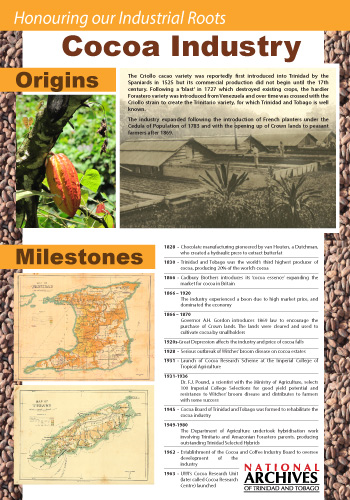 |
| From Slavery to Emancipation
The Trans-Atlantic Slave Trade brought the first large group of people to Trinidad and Tobago. Amounting to some 44,000 enslaved Africans, their journey from Africa to settlement and life on the plantations as well as their resistance, revolt and rebellion that gave rise to their freedom, is recounted in this exhibition. Click here to download (18.39 MB)
|
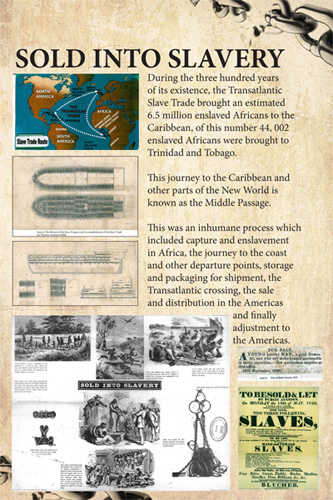 |
| Our African Legacy: Roots and Routes
The various journeys through which people of African descent – enslaved, liberated or free, came to Trinidad and Tobago, during the 17th to 19th centuries are explored. This exhibition commemorates the International Decade for People of African Descent (2015-2024). Click here to download (5.66MB)
|
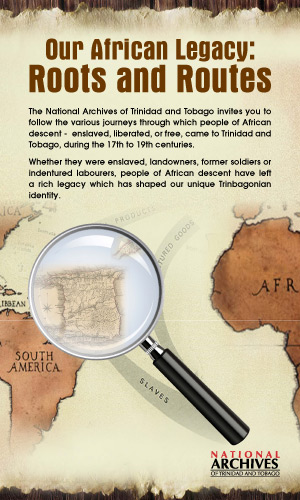 |
|
The Legacy of the First Peoples In commemoration of the First Peoples' national one-off holiday on 13 October 2017, this exhibition traces the history and heritage of the our first inhabitants, the First Peoples, who occupied land without borders, some 7000 years ago. |
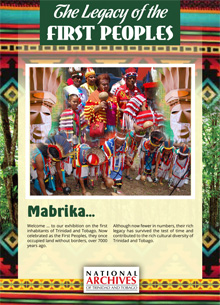 |
|
Carnival of Long Ago Carnival of Long Ago" was the theme of our Carnival 2017 exhibition which featured the sculptural installation by Leighton James. This exhibition complemented the installation of over 200 wooden Carnival figurines depicting the drama of Carnival in the 1950's and 1960's.
|
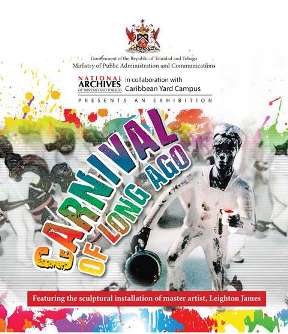 |


